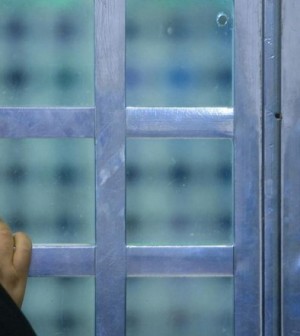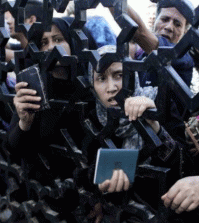- Finding Unshakable Power in a World That Wants to Pull Us ApartPosted 5 months ago
- What could a Donald Trump presidency mean for abortion rights?Posted 5 months ago
- Financial Empowerment: The Game-Changer for Women in Relationships and BeyondPosted 6 months ago
- Mental Health and Wellbeing Tips During and After PregnancyPosted 7 months ago
- Fall Renewal: Step outside your Comfort Zone & Experience Vibrant ChangePosted 7 months ago
- Women Entrepreneurs Need Support SystemsPosted 7 months ago
UN appeals to Iran not to execute woman for crime as a teenager

By Stephanie Nebehay
GENEVA, June 26 (Reuters) – The U.N. human rights chief appealed to Iran on Thursday not to execute a woman convicted of murdering her husband at age 17.
Razieh Ebrahimi, imprisoned in Ahwaz, is among some 160 people thought to be on death row in Iran for crimes committed before they turned 18, U.N. High Commissioner for Human Rights Navi Pillay said in a statement.
More than 250 people are believed to have been executed in Iran this year, Pillay said.
“The imminent execution of Razieh Ebrahimi has once again brought into stark focus the unacceptable use of the death penalty against juvenile offenders in Iran,” she said.
Ebrahimi was married at 14 and gave birth to a child a year later. She says that her husband subjected her to domestic violence, according to the statement. She was arrested in 2010.
“Regardless of the circumstances of the crime, the execution of juvenile offenders is clearly prohibited by international human rights law,” said Pillay, a former international judge.
Jannat Mir, a 17-year-old Afghan, was hanged in April in Isfahan prison in Iran for drug-related crimes, she said, raising concerns about whether he had a fair trial, because he was said not to have had access to a lawyer or consular services. Five other Afghans were executed with him for similar offences.
Four “political prisoners” from the Kurdish minority – named as Hamed Ahmadi, Kamal Malaee, Jahangir Dehghani and Jamshed Dehghani – are also at imminent risk of execution, Pillay said.
They were convicted in 2010 on charges of Moharebeh (enmity against God) and Mofsid fil Arz (corruption on earth) after trials that fell short of the international fair trial standards, she said.
At least six political prisoners are among more than 250 people believed to have been executed in Iran this year, while some sources suggested a “considerably higher figure”, she said.
Most of the executions were for drug-related offences, which do not meet the threshold of “most serious crimes” for which the death penalty may be applied in international law, Pillay said.
At least 500 people are known to have been executed in Iran in 2013, including 57 in public, she said.
President Hassan Rouhani has failed to fulfil campaign promises to allow greater freedom of expression and there has been a sharp rise in executions since his election, U.N. Secretary-General Ban Ki-moon said in March.
The U.N. Human Rights Council on Thursday called on all states to ensure that the death penalty is not imposed for crimes committed by under-18s and to work toward abolition of the death penalty.
China, India, Japan, Pakistan and Saudi Arabia were among member states voting against the resolution brought by the European Union on behalf of a group of sponsors at the forum.
It was adopted by 29 states in favour, with 10 against and 8 abstentions. Russia and the United States abstained.
“We cannot agree with the slant of this resolution in favour of a moratorium or abolition, nor with the generality expressed that use of the death penalty inevitably leads to violations of human rights,” U.S. ambassador Keith Harper told the talks. (Editing by Larry King)
From our partners at Thomas Reuters Foundation.





